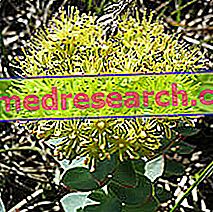
Scientific name
Rhodiola rosea
Family
Crassulaceae
Origin
Northern Europe, Siberia
Used Parts
Drug consisting of the root and the rhizome of the plant
Chemical constituents
- Essential oil;
- Organic acids;
- Tannins;
- Beta Sitosterol;
- Polyphenols;
- Flavonoids;
- Cinnamic glucosides (salidroside and rosavidin).
Rhodiola in Herbalist: Property of Rodiola
Rhodiola extract is known for its powerful adaptogenic activity, but not only. In fact, the plant is also known for its cardioprotective, tonic, nootropic and immunostimulatory activity.
Biological activity
Rhodiola is a plant with many properties, although its use has not obtained official approval for any type of therapeutic indication.
More in detail, adaptogenic, antioxidant, cardioprotective, tonic and immunostimulant properties are ascribed to this plant.
In particular, the adaptogenic activity attributed to rodiola has been widely confirmed by several studies that have shown, precisely, how this plant is able to reduce the sense of fatigue and tiredness and to increase in a non-specific way the resistance of the organism to stress psychophysical. All this seems to be exercised through the reduction of muscle recovery time after an exercise, the increase in protein synthesis, the increase in the levels of adenosine triphosphate (ATP) and creatine phosphate (CP) in striated muscle tissue and the increase of plasma levels of beta-endorphins.
Furthermore, some studies have shown that rhodiola also helps control depressive asthenia and anxious hunger. This activity appears to be carried out through the inhibition of the action of enzymes such as monoamine oxidases (MAOs) and catechol-O-methyl transferases (COMT), ie through the inhibition of enzymes responsible for the metabolism of neurotransmitters such as serotonin and dopamine. Indeed, it is believed that one of the triggers of depression and its symptoms lies precisely in a deficit of these same neurotransmitters.
However, before more medical applications of rhodiola can be approved, more in-depth clinical studies are certainly needed.
Rhodiola in folk medicine and homeopathy
The adaptogenic properties of rhodiola are also known in folk medicine, which uses the plant as a remedy to improve physical endurance and productivity at work. Furthermore, the plant is also used to combat tiredness and to treat diseases such as anemia, impotence, depression, infections, nervous system disorders and gastrointestinal disorders.
As far as homeopathic medicine is concerned, on the other hand, at the moment rhodiola has no use in this area.
Contraindications
Avoid taking rhodiola in case of proven hypersensitivity to one or more components.
Moreover, given the potential antidepressant effects exerted by the plant, its use is not recommended even in patients suffering from bipolar disorder who experience the development of manic episodes following the use of antidepressant drugs or stimulating remedies.
Pharmacological Interactions
- not known
Warnings
Additive effects may occur if rhodiola is administered concomitantly with other adaptogenic and / or stimulant remedies.



